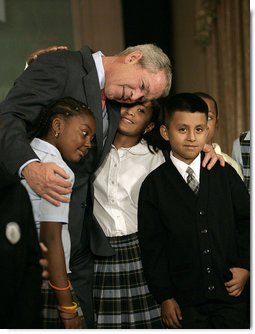| ||||||||||||||||||||||||||||||||||||||||||||||||||||||||||||||||||||||||||||||||||||||||||||||||||||||||||||||||||||||||||||||||
|
September 26, 2007 10:29 A.M. EDT THE PRESIDENT: Good morning. Laura and I are really pleased to be here in New York City, and really pleased to be able to be here with the Mayor and the Superintendent1 and our Secretary of Education, and particularly we're pleased to be with the students and principals of -- the principal and students of PS 76.
Last week the school system here in New York City received the Broad Prize for Urban Education. This is one of the most prestigious2 education prizes in the country. The award is given every year to large urban school districts that have shown the greatest overall performance and improvement in student achievement, while narrowing the achievement gap amongst poor and minority students. In bestowing3 this recognition on New York City, the Broad Prize Committee highlighted the city's strong leadership. And that starts with Mayor Mike Bloomberg. The Mayor is a no-nonsense guy who understands that if you set a goal, you expect to see results in achieving that goal. He knows how to ask tough questions and he's pretty good about moving aside bureaucracy that will inhibit4 the people he has selected to achieve the goal. The person he selected to be the chancellor5 is Joel Klein, who really is one of the country's finest school superintendents6. I appreciate both these men being here, and I want to congratulate you on this well-deserved honor. This city tackled the challenges of under-performing schools in such a way that it has become a model for urban schools. This achievement is a hopeful sign for other school districts across America. If New York City can do it, you can do it. And one of the things that's interesting about the prize and our ability to communicate with each other is that if people are truly interested in figuring out how New York City accomplished7 its objectives they ought to email the school district. They ought to look at the strategy. They ought to figure out what the Mayor and Superintendent have done to empower principals and teachers and parents. And teachers and parents and the principals and the students also deserve credit when it comes to recognizing this award. I also believe that part of the reason why New York City did well is because of the No Child Left Behind Act, which raises standards, insists upon accountability in the schools all across our country. The No Child Left Behind Act is working. I say that because the Nation's Report Card says it's working. Scores are improving, in some instances hitting all-time highs. Children across America are learning. The achievement gap that has long punished underprivileged students is beginning to close. And I'm going to spend a little time talking about that today.
And I want to thank the students again who are here. And the reason I'm glad they're standing here is because all the old folks up here recognize that the future of our country depends on a high-quality education for our children. And that was the reason why people from both political parties came together in Washington to pass the No Child Left Behind Act. The law is based on this premise9: The federal government invests money and education, and we ought to expect results in return for that investment. It's a pretty simple principle. If you're a taxpayer10 and you're spending your money, you want to make sure that money gets good results. And the best way to determine whether you get good results is to measure. Instead of just hoping for the best, we've asked states to set standards to hold schools accountable so that every child can read and do math at grade level. Measuring results is important because it helps teachers spot problems early. You can't solve a problem unless you diagnose the problem, and it's best to diagnose problems early in a child's life. Measuring results gives parents information. If you're interesting in getting parents involved in your schools, just post your results up for people to read. It's amazing how it gets a parent's attention when the schools aren't meeting expectations. A system that doesn't hold people to account assumes that certain children cannot learn, and that it's acceptable to shuffle11 them through school. Well, that's not acceptable in America, to shuffle children through school. That's what I have called the soft bigotry12 of low expectations. Through the No Child Left Behind Act, we have challenged that soft bigotry. And the Nation's Report Card shows we're making good progress.
What all this means is No Child Left Behind Act is working for all kinds of children in all kinds of schools in every part of the country. And so we've got to build on the progress. And that means Congress needs to reauthorize and strengthen the No Child Left Behind Act. The act is working; Congress needs to reauthorize it and make it better. Through this law our nation has made an historic commitment to America's children, and we have a moral obligation to keep that commitment. We must ensure that they have the skills they need to succeed in life, and in a global economy that becomes even more important. As Congress considers reauthorization of the No Child Left Behind Act I've offered several proposals to help strengthen it. And Secretary Spellings is going to be on Capitol Hill to explain why these proposals will make a good law even better. One: We can lift achievement -- student achievement higher by giving local leaders more flexibility13 in the law, as well as providing funding to turn around troubled schools. I believe student achievement will be enhanced when families with children stuck in low-performing schools have a opportunity to send their child to a better school. We should increase access to tutoring programs for students who struggle, and make sure these children get the special help they need. If you measure and you find a problem, it's time to provide tutoring for those children so they can get up to speed. That's what happens here in New York City. The Mayor and the Superintendent and the principal say, when we find a problem, we're going to address that problem early. And it's working. We should reward teachers who improve student achievement in low-income schools. When you find a good teacher willing to go into a school that needs help, that teacher ought to be given an additional incentive14. We should make sure our children are prepared for the jobs of the future, by expanding access to advanced placement courses and strengthening math and science education. As yesterday's positive Report Card shows, childrens [sic] do learn when standards are high and results are measured. And so my call to the Congress is, don't water down this good law. Don't go backwards15 when it comes to educational excellence16. Don't roll back accountability. We've come too far to turn back. So Congress needs to work with this administration to pass legislation that helps -- gives our children the education they deserve. I don't think there's anything more important than the education of young people. I know that's how the Mayor feels, and I know that's how the Superintendent feels, and I know that's how Laura and Margaret feel. There's nothing more American than ensuring that all our children have the chance to realize their fullest potential and their highest dreams. And the improvement in New York City's public schools reminds us of what we can achieve when we set big goals and work hard to meet them. And so I'm proud to be here to congratulate the good folks of New York City. I want to thank all involved with making sure our children have the skills necessary to realize the great hope of America. God bless you all. END 10:39 A.M. EDT 点击  收听单词发音 收听单词发音
|
||||||||||||||||||||||||||||||||||||||||||||||||||||||||||||||||||||||||||||||||||||||||||||||||||||||||||||||||||||||||||||||||
- 发表评论
-
- 最新评论 进入详细评论页>>

 First, I do want to recognize the Secretary of Education, Margaret Spellings. I do want to recognize Louise Sedotto, who is the principal of PS 76. You know, one of the things that's interesting -- I bet you Joel will tell you this -- that when you find a school that is performing well, you find a principal who is willing to think outside the box and lead. And I appreciate you being here, Louise, and I congratulate you and your teachers. I bet you, when I ask your teachers, do they like you, they'll say, we not only like her, we love her. (Laughter.)
First, I do want to recognize the Secretary of Education, Margaret Spellings. I do want to recognize Louise Sedotto, who is the principal of PS 76. You know, one of the things that's interesting -- I bet you Joel will tell you this -- that when you find a school that is performing well, you find a principal who is willing to think outside the box and lead. And I appreciate you being here, Louise, and I congratulate you and your teachers. I bet you, when I ask your teachers, do they like you, they'll say, we not only like her, we love her. (Laughter.)  Here's how the Report Card works. More than 700,000 students from every state have been tested. They've been tested in math and reading, and here are the results. In math, the scores for 4th and 8th graders were higher than they've ever been. In reading, the scores for 4th graders were also the highest on record. The Nation's Report Card shows that some of the achievement gaps amongst African Americans and Hispanic students are narrowing. In the 4th grade reading, the achievement gap between white and African American students is at an all-time low. In 8th grade math, the achievement gap between white and African American, and white and Hispanic students has narrowed since 2003.
Here's how the Report Card works. More than 700,000 students from every state have been tested. They've been tested in math and reading, and here are the results. In math, the scores for 4th and 8th graders were higher than they've ever been. In reading, the scores for 4th graders were also the highest on record. The Nation's Report Card shows that some of the achievement gaps amongst African Americans and Hispanic students are narrowing. In the 4th grade reading, the achievement gap between white and African American students is at an all-time low. In 8th grade math, the achievement gap between white and African American, and white and Hispanic students has narrowed since 2003. 

